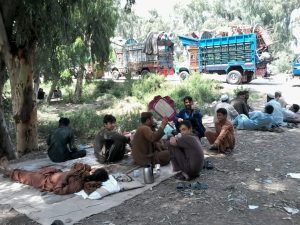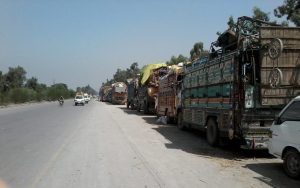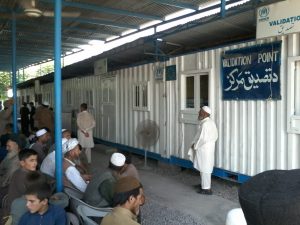Peshawar: Abdul Kareem sits under a eucalyptus tree to seek respite from the blistering sun. His extended family of 30 is spread around him, amid thousands of other Afghan refugees, all sweating and shifting to catch the shade of the few roadside eucalypts.

It has been a week since Kareem and his family came here to Chamkani in the suburbs of Peshawar, where men, women and children wait under the open sky outside the Voluntary Repatriation Centre (VRC) to register for assistance. The centre, run by the United Nations High Commissioner for Refugees (UNHCR), assists Afghan refugees returning home.
Every day, thousands of refugees arrive here as their stay in Pakistan approaches deadline, to register registered for cash and transport assistance before their journey back to Afghanistan. Authorities in Pakistan have extended the stay of Afghan refugees a number of times. This time around, the December 31, 2016 deadline is final.
“We and our families are living the life of animals as we wait for registration,” Kareem told News Lens, as he sat on a grimy mat, spread on the ground. “There is no shelter here, no drinking water or sanitation facility.”
The Pakistan government has adopted a tough stance on Afghan refugees in the wake of December 2014 terrorist attack on the Army Public School (APS) that left more than 140 children dead. The attack was masterminded and claimed by terrorists based in Afghanistan. Among the 20 points of National Action Plan devised after the APS attack to fight terrorism, one deals with a comprehensive policy for registration of Afghan refugees.
Afghan refugees first came to Pakistan in early eighties after Russian intervention in Afghanistan. Even after the Russian pullout from Afghanistan, it has remained unstable and refugees’ influx into and repatriation from Pakistan has continued through the different stages of peace and conflict. Through the three decades of instability in Afghanistan, Pakistan has hosted more than three million Afghan refugees.

More than 200 hundred trucks are parked along the GT road from Nasirpur to Chamkani police station, loaded with the belongings of repatriating Afghans waiting for their turn to get clearance and assistance to proceed to Afghanistan. The refugees leave for their country once UNHCR staff at the VRC scan irises to confirm identities and verify their Proof of Registration (PoR) cards that shows that they are registered as refugees in Pakistan.
This process is mandatory for registered refugees to receive $400 cash assistance from the UNHCR.
According to UNHCR, there are over 1.5 million registered Afghan refugees in Pakistan now. Samad Khan, an External Relations Associate at UNHCR Peshawar, said UNHCR was supposed to repatriate all registered refugees to Afghanistan by December 2016.
Muhammad Suleman, 25, who was born and raised in Pakistan, said he and his family had been waiting outside VRC in miserable conditions for the last eight days.
“After living years of quiet life here in Pakistan, I never thought I would ever face such turmoil in life again,” said Suleman, wiping sweat and tears from his face. He said he had been buying food from makeshift food stalls selling substandard food items for a high price because he cannot leave the place.
“We cannot even protest by blocking roads to get the attention of authorities because we cannot get in trouble with police as we are with families.”
Kareem said that their wait gets longer because police and guards at VRC make families jump the cue and enter the VRC out of turn after getting a bribe of PKR10, 000 from a family. “Authorities in Pakistan are seeing this as one last opportunity to mint money from Afghans,” said Kareem.
However, guards and police at the spot denied the allegations. “We cannot even think of doing this to these helpless people,” said a guard who didn’t want to be named because he was not authorized to speak to media.
Suleman said the behavior of officials at VRC was also “uncooperative.” Many of these officials, he said, were his fellow countrymen. “No officials from UNHCR or the Afghan Commissionerate have bothered to come inquire about our miseries in these eight days.”
He said the slow pace of registration at VRC was why thousands of Afghan refugees were forced to live out in the open outside the centre for days on end.

The VRC at Chamkani in Peshawar is the only repatriation centre in the Khyber Pakhtunkhwa province. There is one more in the border province of Baluchistan that also hosts Afghans refugees. The VRC at Peshawar caters to Afghan refugees from all over KP, Azad Kashmir and even Punjab.
UNHCR, said Sarmad, did not anticipate such a large number of refugees. “Increasing assistance amount from $200 to $400 by UNHCR and Pakistani government’s tough stand on Afghans has created a surge in the number of returning refugees.”
He said since January 1, 2016, 10,198 families (50,033 individuals) had been registered at the centre, of which 8842 families (43,773 individuals) were registered from July 18 till date, with an average of 500 families per day.
Keeping in view the increasing number of refugees, UNHCR is planning to establish another VRC at Nowshera, said Sarmad. He said UNHCR was also considering increasing work shifts at VRC and abolishing the day off at the weekend to help assist the returning refugees.



